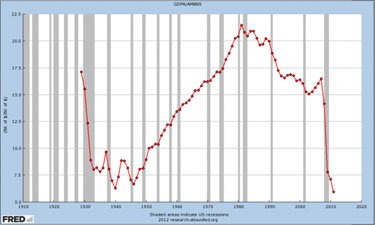
Money velocity has recently declined far below any point during the Great Depression of the 1930s.
Tyler Durden argues that the real state of the US economy, measured by velocity of money, is today far worse than it was during the Great Depression, and federal monetary easing is a disastrous policy certain to produce the same result very shortly in the United States that it did in Weimar Germany.
Velocity of money is the frequency with which a unit of money is spent on new goods and services. It is a far better indicator of economic activity than GDP, consumer prices, the stock market, or sales of men’s underwear (which Greenspan was fond of ogling). In a healthy economy, the same dollar is collected as payment and subsequently spent many times over. In a depression, the velocity of money goes catatonic. Velocity of money is calculated by simply dividing GDP by a given money supply. This VoM chart [above] using monetary base should end any discussion of what â€this†is and whether or not anybody should be using the word “recovery†with a straight face.
In just four short years, our “enlightened†policy-makers have slowed money velocity to depths never seen in the Great Depression. Hard to believe, but the guy who made a career out of Monday-morning quarterbacking the Great Depression has already proven himself a bigger idiot than all of his predecessors (and in less than half the time!!). During the Great Depression, monetary base was expanded in response to slowing economic activity, in other words it was reactive (here’s a graph) . They waited until the forest was ablaze before breaking out the hoses, and for that they’ve been rightly criticized. Our “proactive†Fed elected to hose down a forest that wasn’t actually on fire, with gasoline, and the results speak for themselves. With the IMF recently lowering its 2012 US GDP growth forecast to 2%, while the monetary base is expanding at about a 5% clip, know that velocity of money is grinding lower every time you breathe.
The Fed’s refusal to recognize the importance of velocity of money quickly goes from idiotic to insidious. Here’s a question: If I give you 50¢ and as a result of that transaction, you owe me $1.00, what interest rate have I charged you? Obviously, I’ve charged you 100% interest. ….
In 2011, every dollar of GDP growth created $2.08 in debt. In real life, that’s 108% interest plus the nominal rate, and our twisted leaders want you say, “Thank you sir, may I have another!â€
2011 wasn’t an anomaly either; it’s the new normal.
Read the whole thing.
Hat tip to the News Junkie.





GoneWithTheWind
In the 30’s FDR practiced Keynesian economics and the great depression lasted 11 years. If WW II hadn’t changed policies and priorities we may well never have exited the depression. Today Obama is practicing the same Keynesian economic policies but with more gusto. The result will be disasterous. This propping up the economy with massive amounts of borrowed money has hidden the seriousness of the problem but it hasn’t fixed it. We should have allowed the too big to fail, fail and let companies like GM go bankrupt and reorganize under rules that would have allowed them to get out from under the thumb of the unions. We should have let the homes go into default and be sold for pennies on the dollar. If we had done this beginning in 2009 when it was obvious we were in a shit storm we would be recovering today. Instead we have kicked the can down the road and made the inevitable crash much worse when it happens. Sadly I doubt that Romney and the Republicans have the guts to bite the bullet. I predict 10-15 years of 10-20% unemployment and depression. And that is the good prediction because I think it is far more likely that our antagonist will see our weakness and decide to fight WW III. Worse, I’m not sure we can win this time.
Please Leave a Comment!